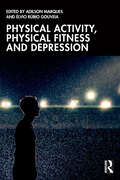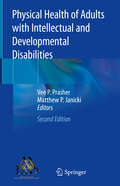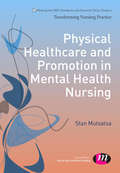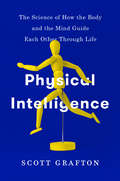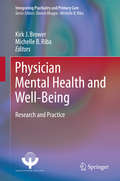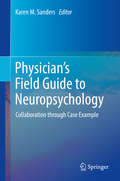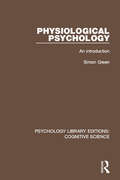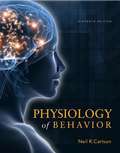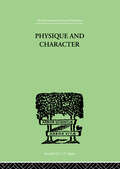- Table View
- List View
Physical Activity, Physical Fitness and Depression
by Adilson Marques Élvio Rúbio GouveiaThis innovative book, Physical Activity, Physical Fitness and Depression, brings together critical reviews of issues in the relationship between physical activity, fitness, and depression, stimulating individual reflection and including debate on current research, methodologies, and applied practices. This book helps the reader understand the magnitude of depression as a disease that has increased its prevalence in recent decades and the other health problems associated with it. Since psychotherapy and pharmacotherapy are often used to treat depression, this exponentially increases health costs for national health systems. In addition, there are always side effects associated with pharmacotherapy. Therefore, other ways, less expensive and without side effects, for treating depression are important. This book outlines the ways that physical activity and physical fitness are viable options for preventing and treating depression. Designed as a supplementary textbook, Physical Activity, Physical Fitness and Depression is key reading for students and academics alike in the areas of sports science, sport psychology, sports therapy, and psychology, and with its thematic content, the book’s allure extends to professionals, including practitioners, psychologists, psychiatrists, and sports organisations, who stand to gain valuable insights from its contents.
Physical Appearance, Stigma, and Social Behavior: The Ontario Symposium Volume 3 (Psychology Revivals)
by Herman C. Peter Zanna Mark P. Higgins E. ToryOriginally published in 1986, this book grew out of a symposium held in 1981 at the University of Toronto on physical appearance as a determinant of personality and social behavior. There is little doubt that one’s appearance has some impact on the way one is perceived and treated; and presumably, owing to the socially reflected nature of the self, one’s personality likewise will be affected by one’s appearance. The questions arising from these basic observations and assumptions are many, and the expert contributors were invited to discuss their research on some of the implications of individual differences in appearance as they ramify into personality and social interaction. The chapters in this volume are the outcome of those discussions and cover the areas of facial attractiveness; physique; impact on social behavior, and deviance. Still a topic of interest to this day, this book can now be read and enjoyed in its historical context.
Physical Exercise Interventions for Mental Health
by Michelle Riba Lam, Linda C. W. and Riba, Michelle Lam, Linda C. W.Exercise is well known to be beneficial to physical health; however, increasing research indicates that physical exercise is also beneficial to brain health and may alleviate symptoms of mental disorders. This book, written by international experts, describes and explores the theory and practice of exercise intervention for different mental disorders across the life span. Drawing on evidence from basic neuroscience research, and enriched with findings from the latest clinical trials, the work provides clear descriptions of current practice and highlights ways to translate this knowledge into pragmatic advice for use in daily practice. The chapters cover a broad range of conditions including neurodevelopmental disorders, depression, anxiety, psychosis and late life neurocognitive disorders. This book is for mental health clinicians including psychiatrists, psychologists, social workers, nurses, as well as internists, paediatricians and geriatricians seeking a comprehensive and individualized approach to treatment.
Physical Health of Adults with Intellectual and Developmental Disabilities
by Vee P. Prasher Matthew P. JanickiThis fully revised and expanded second edition brings together findings from research and clinical practice, with comprehensive coverage of the important aspects of physical health in persons with intellectual disability. Professionals involved in the medical and social care and support of persons with intellectual disability should have a broad understanding of the essential range of issues, and therefore this book provides a truly multi-disciplinary perspective, complete with many tables, figures, and illustrations to underline the key points. The reader is updated on ongoing developments in the general population, which will become increasingly more relevant to adults with intellectual disability. This book also acknowledges that the impact on the person and on their carers always needs to be taken into account, with treatment programs established with a multi-faceted team approach in mind. This book is aimed at an international audience of physicians and other allied health personnel concerned about the health and welfare of adults with intellectual disability. It should also be of interest to researchers, administrators, and senior program personnel engaged in this field.
Physical Healthcare and Promotion in Mental Health Nursing (Transforming Nursing Practice Series)
by Stanley MutsatsaIt is essential for mental health nurses to understand the physical health needs of people with mental health disorders in order to provide holistic care. Yet these people often have their physical health needs unrecognised or poorly managed. This book is a practical and informative guide to the physical health care of people with mental health illnesses. It covers a range of health-promotion strategies, including exercise, diet and oral health, and assessment, intervention and skills for common physical disorders found in people with mental-health problems. It takes a recovery perspective and emphasises the importance of communication and collaborative care for adherence to healthy lifestyles.
Physical Healthcare and Promotion in Mental Health Nursing (Transforming Nursing Practice)
by Stanley MutsatsaIt is essential for mental health nurses to understand the physical health needs of people with mental health disorders in order to provide holistic care. Yet these people often have their physical health needs unrecognised or poorly managed. This book is a practical and informative guide to the physical health care of people with mental health illnesses. It covers a range of health-promotion strategies, including exercise, diet and oral health, and assessment, intervention and skills for common physical disorders found in people with mental-health problems. It takes a recovery perspective and emphasises the importance of communication and collaborative care for adherence to healthy lifestyles.
Physical Intelligence: The Science of How the Body and the Mind Guide Each Other Through Life
by Scott GraftonElegantly written and deeply grounded in personal experience—works by Oliver Sacks come to mind—Physical Intelligence gives us a clear, illuminating examination of the intricate, mutually responsive relationship between the mind and the body as they engage (or don&’t engage) in all manner of physical action.Ever wonder why you don&’t walk into walls or off cliffs? How you decide if you can drive through a snowstorm? How high you are willing to climb up a ladder to change a lightbulb? Through the prisms of behavioral neurology and cognitive neuroscience, Scott Grafton brilliantly accounts for the design and workings of the action-oriented brain in synchronicity with the body in the natural world, and he shows how physical intelligence is inherent in all of us—and always in problem-solving mode. Drawing on insights gleaned from discoveries by engineers who have learned to emulate the sophisticated solutions Mother Nature has created for managing complex behavior, Grafton also demonstrates the relevance of physical intelligence with examples that each of us might face—whether the situation is mundane, exceptional, extreme, or compromised.
Physical Touch in Psychoanalytic Psychotherapy: Transforming Trauma through Embodied Practice
by Edward T NovakThis groundbreaking book presents a new model for incorporating the human body, and specifically physical touch, into psychoanalysis and psychotherapy, particularly for patients who have experienced trauma. Novak’s model of informed and disciplined touch articulates five categories of touch and three phases of therapeutic body work, all of which can help move the patient and therapist directly into bodily experiences that enable trauma memories to be processed, and then analyzed and transformed. This transformation leads to patients experiencing their bodies in fundamentally new ways, both relationally and intrapsychically. The book also grapples with the risks and ethics of working directly with patients’ bodies, outlining theoretical and clinical elements that help create a safe and sacred therapeutic structure. Novak’s model offers a continuum of touch from everyday physical interactions, such as handshakes or hugs, to more complex and complete ways of working with the body that are safe and meaningful and that create an integrated experience of the patient’s mind and body. Physical Touch in Psychoanalytic Psychotherapy is of interest to therapists at all levels of experience in the fields of counseling, social work, psychotherapy, and psychoanalysis. Practitioners in other helping professions such as healthcare, massage therapy, and physical therapy, as well as providers of wholistic medicine, will also be able to make use of the comprehensive clinical model and case studies detailed in the book.
Physical Violence in American Families: Risk Factors And Adaptations To Violence In 8,145 Families
by Murray StrausThe informative and controversial findings in this book are based on two path-breaking national surveys of American families. Both show that while the family may be the central locus of love and support, it is also the locus of risk for those who are physically assaulted. The book provides a wealth of information on gender differences and similarities in violence, and on the effects of gender roles and inequality.Two landmark American studies of violence from the National Family Violence survey form the basis of this book. Both show that while the family may be the central locus of love and support, it is also the locus of risk for those who are being physically assaulted. This is particularly true for women and children, who are statistically more at risk of assault in their own homes than on the streets of any American city. Physical Violence in American Families provides a wealth of information on gender differences and similarities in violence, and on the effects of gender roles and inequality. It is essential for anyone doing empirical research or clinical assessment.
Physically Active University Teaching: Introduction to the Heidelberg Model of Physically Active Teaching (essentials)
by Robert Rupp Chiara Dold Jens BuckschIn this essential, the authors present an innovative teaching-learning concept that uses the potential of movement-activating approaches to make university teaching more motivating, more efficient for learning and more conducive to health. Based on current findings in health, work and learning research, the Heidelberg Model of Moving Teaching presents a proven approach that combines university teaching-learning processes with light (micro) movement - such as standing up or walking around - in a way that saves learning time and is close to the classroom. This gives students the opportunity to abandon the rigid sitting posture during teaching and to actively engage with the subject matter (through movement). The essential contains practice-stimulating recommendations and concrete examples of implementation for a moving design of university teaching.
Physician Burnout: How to Rise Above a Broken Healthcare System as a Practicing Clinician
by Dimitrios TsatirisPhysician Burnout: How to Rise Above a Broken Healthcare System as a Practicing Clinician is a comprehensive self-help guide that provides practical strategies based on groundbreaking research to help physicians overcome burnout.Written by a board-certified psychiatrist who provides mental healthcare to physicians, this book is rich in pragmatic, evidence-based strategies to help the reader be better equipped to navigate the daily rigors of practicing medicine. It contains countless clinical examples that illustrate how to overcome burnout and rise above the ever-complex and fragmented landscape of the U.S. healthcare system.In addition, this book examines how the healthcare system contributes to physician suffering and provides recommendations for improving the culture of medicine.This book is an essential read for physicians and trainees suffering from burnout as well as anyone who cares about the future of medicine.
Physician Mental Health and Well-Being
by Kirk J. Brower Michelle B. RibaThis book explores the important topic of mental health and related problems among physicians, including trainees. The all-too-common human response of "suffering in silence" and refusing to seek help for professional and personal issues has ramifications for physicians who work in safety-sensitive positions, where clear-headed judgment and proper action can save lives. Problems covered include burnout, disruptive and unprofessional behaviors, impaired performance, traumatic stress, addiction, depression and other mood disorders, and suicide. The authors of this work include psychologists, psychiatrists, and other physicians who diagnose and treat a range of patients with stress-related syndromes. Among their patients are physicians who benefit greatly from education, support, coaching, and treatment. The book's content is organized into three parts with interconnecting themes. Part I focuses on symptoms and how physicians' problems manifest at the workplace. Part II discusses the disorders underlying the manifesting symptoms. Part III focuses on interventions at both the individual and organizational levels. The major themes investigated throughout the book are developmental aspects; mental health and wellbeing as a continuum; and the multifactorial contributions of individual, interpersonal, organizational, and cultural elements to physician health. This book is intended for anyone who works with, provides support to, or professionally treats distressed physicians. It is also intended for healthcare leaders and organizations that are motivated to improve the experience of providing care and to change the culture of silence, such that seeking help and counsel become normal activities while minimizing stigma. By writing this book, the authors aim to outline effective pathways to well-being and a healthy work-life balance among physicians, so that they may provide optimal and safe care to their patients.
Physician's Field Guide to Neuropsychology: Collaboration through Case Example
by Karen M. SandersThis unique volume teaches those in the medical fields about the scientific value of neuropsychology in assessing cognition, the 6th vital sign, as part of well integrated collaborative care. It offers physicians a comprehensive tour of the many dimensions neuropsychology can add to primary and specialized medical care across the lifespan. Noted experts examine cognitive ramifications of a wide range of medical, psychological, and neuropsychological conditions, among them brain tumors, stroke, epilepsy, pediatric and adult TBI, schizophrenia, and adult ADHD. The book’s generous selection of case examples demonstrates the benefits of cognitive assessment in building accurate diagnoses, better understanding of patient needs, and more appropriate treatment and management strategies, as well as other neuropsychologist roles in consulting, referral, and forensic areas. In addition, tables, callout boxes, review questions, and other features are included throughout the text for ease in comprehension and retention. A sampling of the coverage:· The value of neuropsychological evaluation in medical practice. · A model of collaboration between primary care and neuropsychology. · Neuropsychological assessment of extremely preterm children. · Alzheimer’s Disease and overview of dementia. · Deep brain stimulation for Parkinson’s Disease. · Neuropsychology in the 21st century: the rise of multicultural assessment. · Neuropsychological interventions for individuals with brain injury. The Physician’s Field Guide to Neuropsychology is both a rigorous and an accessible reference for clinicians in diverse disciplines including general practice, family medicine, neuropsychology, pediatrics, gerontology, and sports medicine.
Physician-Assisted Death in Perspective
by Stuart J. Youngner Gerrit K. KimsmaThis book is the first comprehensive report and analysis of the Dutch euthanasia experience over the last three decades. In contrast to most books about euthanasia, which are written by authors from countries where the practice is illegal and therefore practised only secretly, this book analyzes empirical data and real-life clinical behavior. Its essays were written by the leading Dutch scholars and clinicians who shaped euthanasia policy and who have studied, evaluated and helped regulate it. Some of them have themselves practised euthanasia. The book will contribute to the world literature on physician-assisted death by providing a comprehensive examination of how euthanasia has been practised and how it has evolved in one specific national and cultural context. It will greatly advance the understanding of euthanasia among both advocates and opponents of the practice.
Physics of the Human Temporality: Complex Present (Understanding Complex Systems)
by Ihor Lubashevsky Natalie PlavinskaThis book presents a novel account of the human temporal dimension called the “human temporality” and develops a special mathematical formalism for describing such an object as the human mind. One of the characteristic features of the human mind is its temporal extent. For objects of physical reality, only the present exists, which may be conceived as a point-like moment in time. In the human temporality, the past retained in the memory, the imaginary future, and the present coexist and are closely intertwined and impact one another.This book focuses on one of the fragments of the human temporality called the complex present. A detailed analysis of the classical and modern concepts has enabled the authors to put forward the idea of the multi-component structure of the present. For the concept of the complex present, the authors proposed a novel account that involves a qualitative description and a special mathematical formalism. This formalism takes into account human goal-oriented behavior and uncertainty in human perception.The present book can be interesting for theoreticians, physicists dealing with modeling systems where the human factor plays a crucial role, philosophers who are interested in applying philosophical concepts to constructing mathematical models, and psychologists whose research is related to modeling mental processes.
Physik ganz smart: Die Gesetze der Welt mit dem Smartphone entdecken
by Jochen Kuhn Patrik VogtIm vorliegenden Buch werden rund 50 physikalische Experimente vorgestellt, in denen Smartphones oder Tablet-Computer zur Messwerterfassung genutzt werden. Die Autoren decken zahlreiche Themenfelder der Physik ab: Kinematik und Dynamik, Hydrostatik und -Dynamik, Mechanische Schwingungen und Wellen, Akustik, Elektrodynamik und Radioaktivität. Leserinnen und Leser untersuchen beispielsweise mit den Beschleunigungssensoren des Smartphones den freien Fall, messen die Flügelschlagfrequenz von Insekten, bestimmen die Klopfspecht-Art mithilfe ihrer Akustik und untersuchen, wie stark unterschiedliche Materialien radioaktive Strahlung abschirmen. Für jedes Experiment wird der theoretische Hintergrund, die Versuchsdurchführung und -Auswertung besprochen. Eine Aufstellung der genutzten Apps, einschließlich Bezugsquellen und Hinweise zu anfallenden Kosten, ist am Ende des Buches aufgelistet.Alle vorgestellten Experimente sind bewusst als Einzelbeiträge verfasst und können somit unabhängig voneinander gelesen und erprobt werden. Dadurch ist man nicht an die vorgegebene Reihenfolge gebunden und kann sich beim Durcharbeiten des Buches allein von den persönlichen Interessen leiten lassen.Das Buch richtet sich an alle Dozierenden des Fachs Physik, Studierende des Lehramts, Referendarinnen und Referendare, ausgebildete Lehrerinnen und Lehrer und hilft bei der Unterrichtsgestaltung, Ideenfindung und letztendlich Einbindung moderner Medien im Physikunterricht.Die HerausgeberProf. Dr. Jochen Kuhn hat 2002 an der Universität Koblenz-Landau promoviert und dort 2009 habilitiert. Er ist seit 2012 Universitätsprofessor an der Technischen Universität Kaiserslautern und Leiter der Arbeitsgruppe „Didaktik der Physik“. Sein Arbeits- und Forschungsschwerpunkt ist das fachbezogene Lehren und Lernen mit digitalen Medien in Schule und Hochschule.Dr. Patrik Vogt hat sich nach einem Lehramtsstudium in Landau und dem Referendariat in Kaiserslautern im Jahr 2010 am Fachbereich „Natur- und Umweltwissenschaften“ der Universität Koblenz-Landau mit einer Arbeit zur Physikdidaktik promoviert. Nach mehreren Stationen als wissenschaftlicher Mitarbeiter und Realschullehrer leitet er seit 2019 den Fachbereich „Medienbildung, Mathematik, Naturwissenschaften“ am Institut für Lehrerfort- und -weiterbildung in Mainz. Seine Arbeitsschwerpunkte bilden die Einsatzmöglichkeiten mobiler Endgeräte im Physikunterricht, speziell als Messinstrument, die Aufgabenkultur sowie die Physik des Alltags.
Physiological Influences of Music in Perception and Action (Elements in Perception)
by Shannon E. Wright Valentin Bégel Caroline PalmerThis Element reviews literature on the physiological influences of music during perception and action. It outlines how acoustic features of music influence physiological responses during passive listening, with an emphasis on comparisons of analytical approaches. It then considers specific behavioural contexts in which physiological responses to music impact perception and performance. First, it describes physiological responses to music that evoke an emotional reaction in listeners. Second, it delineates how music influences physiology during music performance and exercise. Finally, it discusses the role of music perception in pain, focusing on medical procedures and laboratory-induced pain with infants and adults.
Physiological Psychology (Psychology Library Editions: Cognitive Science)
by John BlundellPhysiological psychology deals with the interaction between ‘under the skin’ physiological variables and the personal and social context in which organisms live. Originally published in 1975, much of this book has relevance for the understanding of human action: knowledge of physiological mechanisms underlying psychological functions can throw light on conditions such as obesity, schizophrenia, and the emotional disorders, and on procedures such as psychosurgery and drug therapy.
Physiological Psychology: An Introduction
by Meetu KhoslaProvides easy and accessible understanding of the effects of biological aspects on our behavior Physiological Psychology: An Introduction explains the dynamic interaction between physiology and psychology through key biological concepts. By using an interactive approach, which has been extensively applied in the classroom, the author presents core concepts and topics in a manner that is coherent, lucid, and easy to recall. The book includes detailed coverage of human evolution, central and peripheral nervous systems, hormonal regulation of behavior, and hemispheric specializations of the brain. Each chapter offers a historical development of the topics and up-to-date reviews of literature in the rapidly changing fields of neuroscience and biopsychology. Key Features • Use of simple language and guided imagery to explain complex topics • Rich pedagogical features, including boxes that provide insights into instances from daily life, chapter-wise glossary lists, and extensive review exercises • Wide topical coverage to cater to the course curriculums of major Indian universities • Chapters aided by clearly labeled diagrams to encourage visual understanding as well as self-practice
Physiological Psychology: An Introduction (Psychology Library Editions: Cognitive Science)
by Simon GreenOriginally published in 1987 this title was designed as a textbook for first degree students of psychology and provides an introduction to the major topics within the subject of physiological psychology. The aim was to cover these major subject areas and at the same time to provide indications of advances made in the previous two decades. Today the book is still suitable for all levels of study, from beginning students to final year level, who wish to cover historical aspects of physiological psychology.
Physiological and Functional Assessment of Professional Football Players
by Redha Taiar Borja Sañudo Corrales Luis Carrasco Páez Hoyo Lora, Moisés dePhysiological and Functional Assessment of Professional Football Players presents a science-based approach to enhance athletes' performance and prevent muscle injuries. Professional football players undergo a rigorous competitive season with frequent and numerous competitions, exposing them to significant stress that can detrimentally affect their performance and lead to serious injuries in extreme cases. In order to avert such negative outcomes, coaches and team staff must formulate preventive training programs tailored to the unique characteristics and needs of each player.The execution of these individualized training programs necessitates a comprehensive assessment of players' health status, evaluation of their functional and fitness performance, analysis of their muscular structure, identification of muscle imbalances or movement dysfunctions, and detection of potential injury risk factors. Furthermore, it is imperative to monitor the weekly training and competition load using appropriate indicators of external and internal load, adjusting workloads accordingly.In addition, recovery training programs must be meticulously designed for each injured player. This process involves isolating the factors causing the injury and assessing the injury's severity in the initial stage. Subsequently, recovery training programs must be thoughtfully planned, incorporating various assessment tools and procedures to verify the restoration of players' functional ability and inform decisions about the return to play.Physiological and Functional Assessment of Professional Football Players delves into the utilization of appropriate testing protocols and emphasizes that understanding the reported data is crucial for the success of professional football training. This groundbreaking book is essential reading for researchers and practitioners in the fields of soccer, sports science, recovery, data and performance analysis, and soccer coaching.
Physiology Of Behavior
by Neil Carlson Melissa BirkettPhysiology of Behavior provides a scholarly yet accessible portrait of the dynamic interaction between biology and behavior. Lead author Neil Carlson and new co-author Melissa Birkett drew upon their experience teaching and working with students to create the new edition of this comprehensive and accessible guide for students of behavioral neuroscience. In addition to updated research, the Twelfth Edition offers an updated art and visual program and a more robust learning architecture that highlights key concepts, guiding students through the text.
Physiology of Behavior 11th Edition
by Neil R. CarlsonThis book presents an introductory text in behavioural neuroscience and an accessible portrait of the dynamic interaction between biology and behaviour.
Physique and Character: an investigation of the nature of constitution and of the Theory
by Kretschmer, ErnstFirst Published in 1999. Routledge is an imprint of Taylor & Francis, an informa company.
Phytocannabinoids
by A. Douglas Kinghorn Heinz Falk Simon Gibbons Jun’ichi KobayashiThe book presents the current state of the art on phytocannnabinoid chemistry and pharmacology and will be of much use to those wishing to understand the current landscape of the exciting and intriguing phytocannabinoid science. The focus is on natural product cannabinoids which have been demonstrated to act at specific receptor targets in the CNS.
